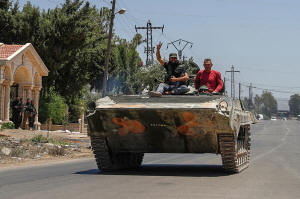Syrian government forces set to reenter Sweida province after renewed
Druze-Bedouin clashes
[July 18, 2025]
By GHAITH ALSAYED and ABBY SEWELL
DAMASCUS, Syria (AP) — Renewed clashes broke out overnight between Druze
armed groups and members of Bedouin clans in southern Syria, and
government forces were preparing to deploy again to the area Friday
after pulling out under a ceasefire agreement that halted several days
of violence earlier this week, officials said.
Government security forces agreed with some of the Druze factions that
they would re-enter the area to impose stability and protect state
institutions, according to two Syrian officials who spoke Friday on
condition of anonymity because they were not authorized to speak
publicly.
Syrian government forces had largely pulled out of the Druze-majority
southern province of Sweida after days of clashes with militias linked
to the Druze religious minority that threatened to unravel the country’s
fragile post-war transition.
The conflict drew airstrikes against Syrian forces by neighboring Israel
in defense of the Druze minority before most of the fighting was halted
by a truce announced Wednesday that was mediated by the U.S., Turkey and
Arab countries. Under that agreement, Druze factions and clerics would
be left to maintain internal security in Sweida, Syria’s interim
President Ahmad al-Sharaa said Thursday.

The clashes initially began between Druze militias and local Sunni
Muslim Bedouin tribes Sunday before government forces intervened,
nominally to restore order, but ended up taking the Bedouins’ side
against the Druze. The fighting killed hundreds of people over four
days, with allegations that government-affiliated fighters executed
Druze civilians and looted and burned homes.
Israel intervened, launching dozens of airstrikes on convoys of
government fighters and striking the Syrian Defense Ministry
headquarters in central Damascus in a major escalation of its
involvement.
The Druze form a substantial community in Israel, where they are seen as
a loyal minority and often serve in the Israeli military.
After the ceasefire and withdrawal of government forces, clashes once
again flared between the Druze and Bedouin groups in parts of Sweida
province. State media reported Druze militias carried out revenge
attacks against Bedouin communities, leading to a wave of displacement.
[to top of second column]
|

Syrian government forces sit on their armored personnel carrier, as
they withdraw from Sweida city, southern Syria, Tuesday, July 15,
2025.(AP Photo/Ghaith Alsayed)

The governor of neighboring Daraa province said in a statement that
more than 1,000 families had been displaced to the area from Sweida
as a result of “attacks on Bedouin tribes by outlaw groups.”
The Druze religious sect began as a 10th-century offshoot of
Ismailism, a branch of Shiite Islam. More than half of the roughly 1
million Druze worldwide live in Syria. Most of the other Druze live
in Lebanon and Israel, including in the Golan Heights, which Israel
captured from Syria in the 1967 Mideast War and annexed in 1981.
While predominantly Druze, Sweida is also home to Bedouin tribes who
are Sunni Muslim and have periodically clashed with the Druze over
the years. The latest escalation began with members of a Bedouin
tribe in Sweida setting up a checkpoint and attacking and robbing a
Druze man, which triggered tit-for-tat attacks and kidnappings.
Ahmed Aba Zeid, a Syrian researcher who has studied armed groups in
southern Syria, said there is “no specific reason” for the historic
tensions between the groups.
“All of Syria is full of social problems that have no reason,” he
said.
In this case, however, “The state exploited the latest problem to
try to change the situation in Sweida, and this only increased the
scope of it,” he said.
___
Sewell reported from Beirut.
All contents © copyright 2025 Associated Press. All rights reserved
 |